Thesis
Generative AI (GenAI) has the potential to transform software development by enhancing efficiency, accuracy, and productivity. Large language models (LLMs), despite being built on relatively simple architectures, excel at coding due to programming’s structured grammar and the availability of extensive, high-quality training data from open-source repositories. As a result, the role of developers is shifting from manual coding to orchestrating AI-driven development ecosystems, aligning with research that suggests AI can save up to 50% of developers’ time on routine programming tasks.
GenAI is already driving changes in enterprises. Amazon CEO Andy Jassy highlighted the impact of their GenAI assistant, Amazon Q Developer, which streamlined software upgrades, saving the equivalent of 4.5K developer-years and providing $260 million in annualized efficiency gains. Similarly, Google CEO Sundar Pichai revealed that AI systems now generate over 25% of new code for Google’s products, supported by tools like the internal AI model "Goose". As of May 2024, 65% of organizations now regularly use GenAI — nearly double the adoption rate from ten months prior.
The adoption of AI tools in software development is projected to grow significantly as these technologies improve. By 2028, 90% of enterprise software engineers are expected to be using AI code assistants, compared to 14% in early 2024. Platform engineering teams leveraging AI across the software development life cycle (SDLC) are forecast to grow from 5% in 2023 to 40% by 2027. As of early 2024, 87% of organizations plan to invest in AI coding tools like GitHub Copilot, with 71% already in some stage of adoption.
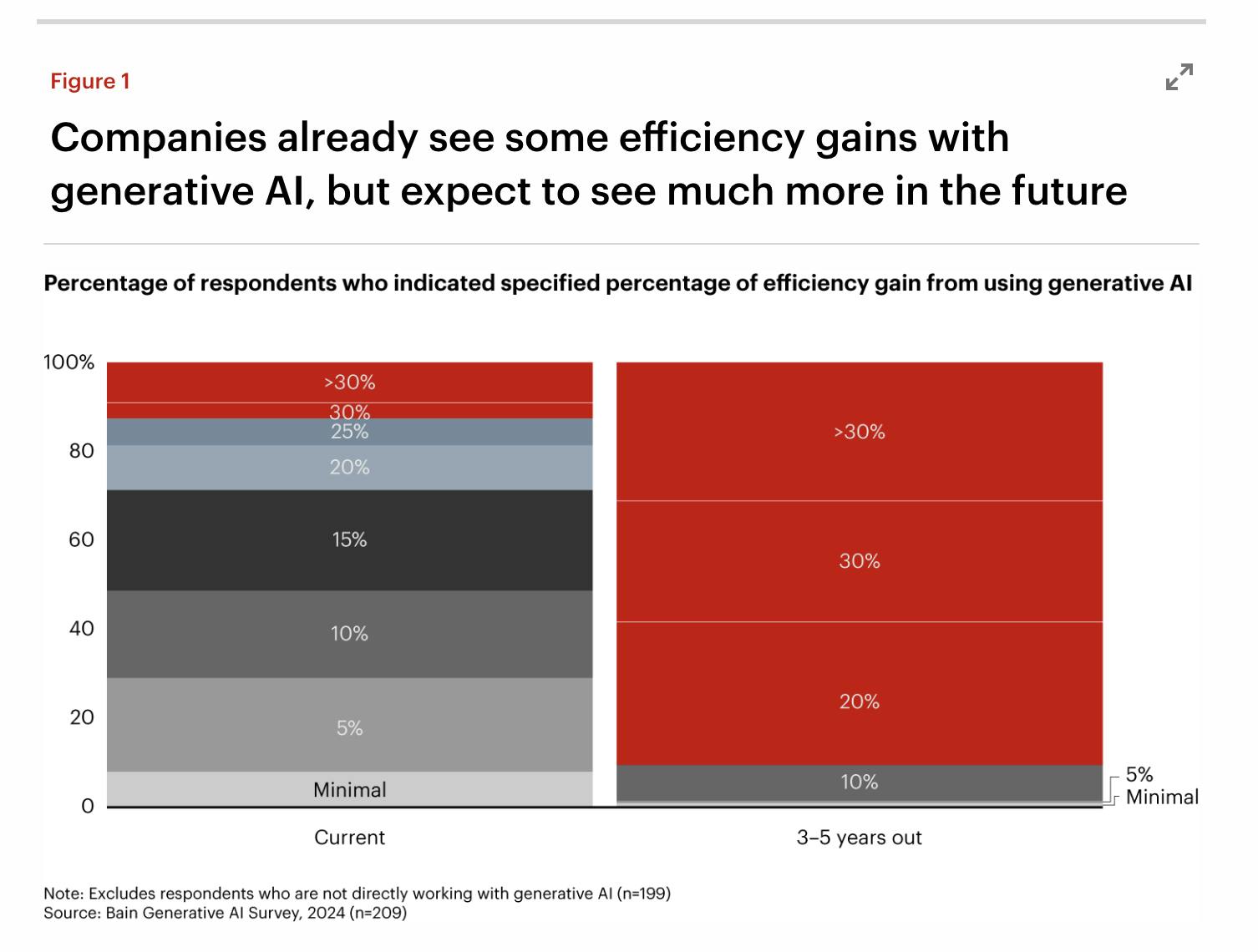
Source: Bain
Despite the potential of GenAI in software development, as of January 2025, productivity gains remain limited, with developers and organizations reporting mixed experiences. While 72% of developers expressed favorable attitudes toward AI coding tools in 2024, this marked a decline from 77% in 2023. Surveys show that two-thirds of developers have yet to see significant productivity improvements.
Challenges such as hallucinations, fragmented solutions, and security concerns complicate the tools’ effectiveness, often requiring engineering oversight to spot subtle bugs or insidious errors. These tools are seen as accelerators for prototyping, learning aids, or MVP generators, but not yet as robust solutions for producing maintainable, production-ready software. Structural barriers like legacy codebases, organizational inertia, and a steep learning curve further hinder adoption. Many AI tools excel at automating simple tasks like documentation but struggle with complex processes requiring human judgment.
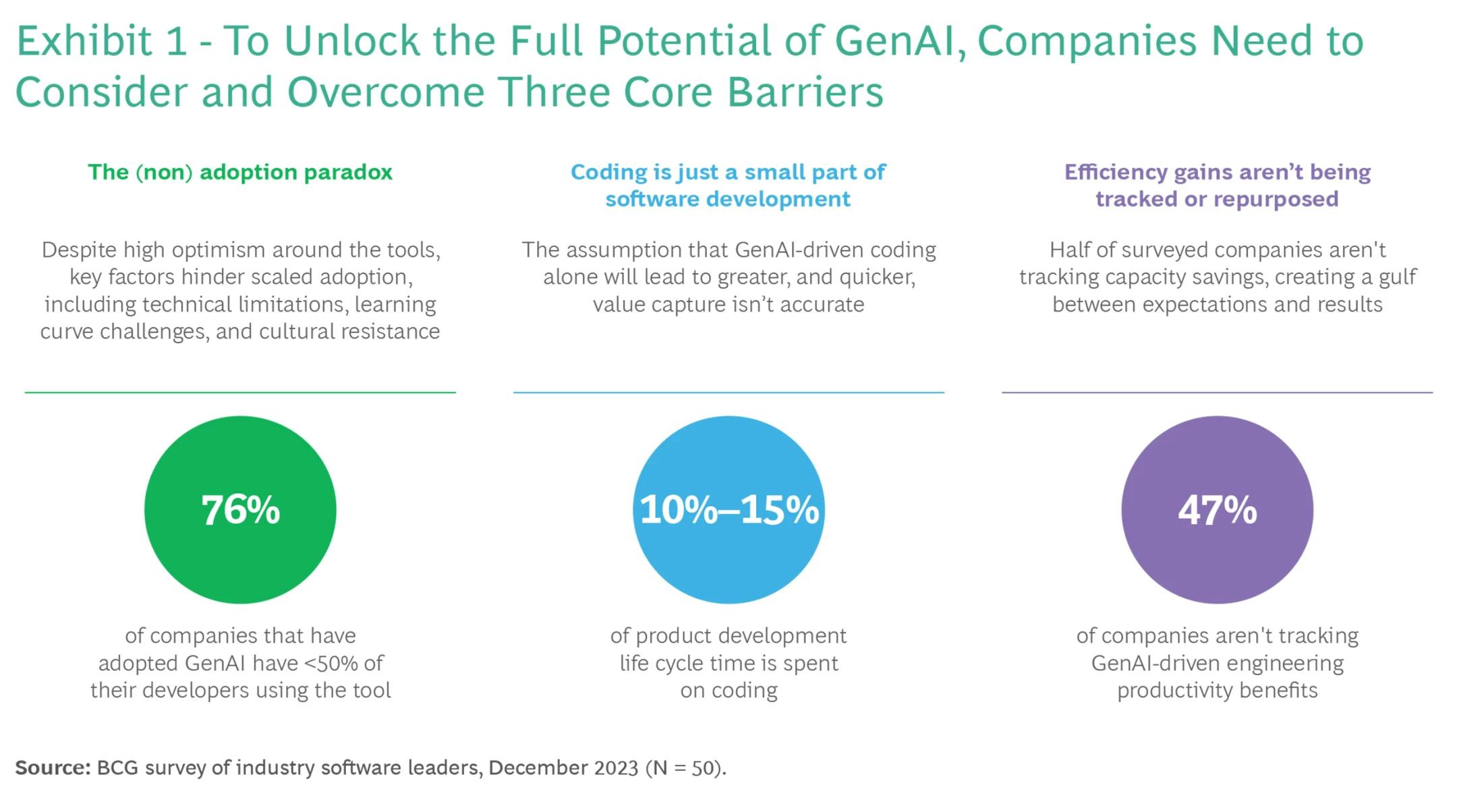
Source: Boston Consulting Group
Enterprise deployments of GenAI face unique challenges. One concern is security, as AI-generated code can introduce vulnerabilities by failing to account for the latest threats or incorporating questionable external dependencies. Issues around intellectual property, licensing, and privacy further complicate the use of AI-generated code, particularly in proprietary software. Enterprises must also grapple with the ethical and legal implications of ownership and responsibility for code created by these tools.
Another hurdle is the complexity of mature enterprise codebases. GenAI tools struggle with integration into legacy systems, internal libraries, and complex debugging or refactoring. These limitations arise from a lack of contextual understanding and alignment with organizational coding standards and architectures. This often results in compatibility issues, increased bug rates, and resource-intensive debugging efforts. Additionally, shallow integration into development workflows and low developer trust further hinder widespread adoption.
Windsurf addresses the challenges of enterprise GenAI deployments by offering a platform that integrates into developer workflows while prioritizing security and context awareness. At its core, Windsurf provides AI-powered code completion, refactoring, and search capabilities, enabling developers to write, review, and navigate code more efficiently. These tools ensure that development teams can work faster and smarter while maintaining control and precision in their workflows.
Unlike many GenAI tools that fragment the developer experience, Windsurf is designed to complement and enhance how teams work with complex codebases. Its advanced context-awareness engine grounds AI-generated suggestions in the existing codebase, reducing hallucinations and ensuring adherence to syntax, semantics, and organizational coding standards. This capability not only streamlines the development process but also aligns with enterprise priorities like robust security and compliance.
Founding Story
Windsurf (formerly Codeium) was founded in June 2021 by Varun Mohan (CEO) and Douglas Chen (Co-Founder). It originally began as Exafunction, a startup dedicated to optimizing GPU utilization at scale.
Mohan and Chen first met in middle school and later became classmates at MIT. Both founders had extensive experience in advanced technical fields before starting Exafunction: Mohan was a tech lead at Nuro, managing large-scale deep learning infrastructure for autonomous vehicles, while Chen worked at Meta, developing software tools for VR headsets like the Oculus Quest. While leading teams responsible for managing extensive deep learning infrastructure for autonomous vehicles, Mohan witnessed the difficulties of scaling AI systems efficiently.
Exafunction was founded to address a critical pain point in the AI industry: the inefficiency of GPU utilization for large-scale deep learning workloads. While GPUs are essential for training and deploying machine learning models, they are challenging to manage due to their high cost, unique operational requirements, and difficulty scaling effectively. Companies often struggled with underutilized GPUs, skyrocketing costs, and complex infrastructure needs when scaling their AI applications. Exafunction set out to create a solution that virtualized GPUs, allowing companies to decouple their workloads from hardware constraints.
However, as GenAI models began to dominate the technology landscape, Mohan and Chen realized that the next wave of innovation wouldn’t just come from infrastructure optimization but from leveraging that infrastructure to create end-user applications that directly enhanced productivity. This insight led to the pivot from Exafunction to Codeium in 2022, transforming the company’s focus from GPU management to developer tools powered by AI. The pivot allowed them to capitalize on their expertise in AI infrastructure while addressing an even broader market opportunity in coding and software development.
Codeium’s first beta product was launched in October 2022 as an extension to existing Integrated Development Environments (IDE. In November 2024, Codeium launched the Windsurf Editor, its own IDE, to further improve the effectiveness of its AI tools.
In April 2025, Codeium rebranded to Windsurf, reflecting a shift in the company’s focus — from an autocomplete plugin to a full AI-native IDE. As the team noted, most users already referred to the product as Windsurf, and the new name better captures their broader ambition: “combining human and machine to result in experiences that feel and appear effortlessly powerful”.
Product
Windsurf’s strategy centers on the effective integration of AI tools into developer workflows, emphasizing usability, context-awareness, and developer empowerment. Unlike tools that aim to replace developers or work in isolation, Windsurf designs solutions that enhance collaboration between humans and AI. Features like Cortex enable developers to accept or reject suggestions rather than automating tasks entirely, positioning the platform as a "cockpit" that provides maximum leverage for reviewing, navigating, and deploying code with greater speed and accuracy. By advancing its understanding of codebases, Windsurf achieved significant improvements in suggestion acceptance rates.
Core Products
Windsurf Plugin: Originally launched as the Codeium Extension in 2022, Windsurf Plugin is designed to integrate seamlessly into developers’ existing coding environments, providing real-time AI-powered assistance directly within popular IDEs like Visual Studio Code, JetBrains, and others. The extension offers intelligent code suggestions, auto-completions, and error corrections.
Windsurf Editor: The Windsurf editor was developed to overcome the UX limitations that arose from relying solely on extensions. The team recognized the need for a new paradigm that combines the collaborative nature of copilots with the independent power of AI agents, which they later termed an "AI flow." It includes all the capabilities of the Windsurf Plugins while also powering Cascade, Windsurf’s AI Flows product.
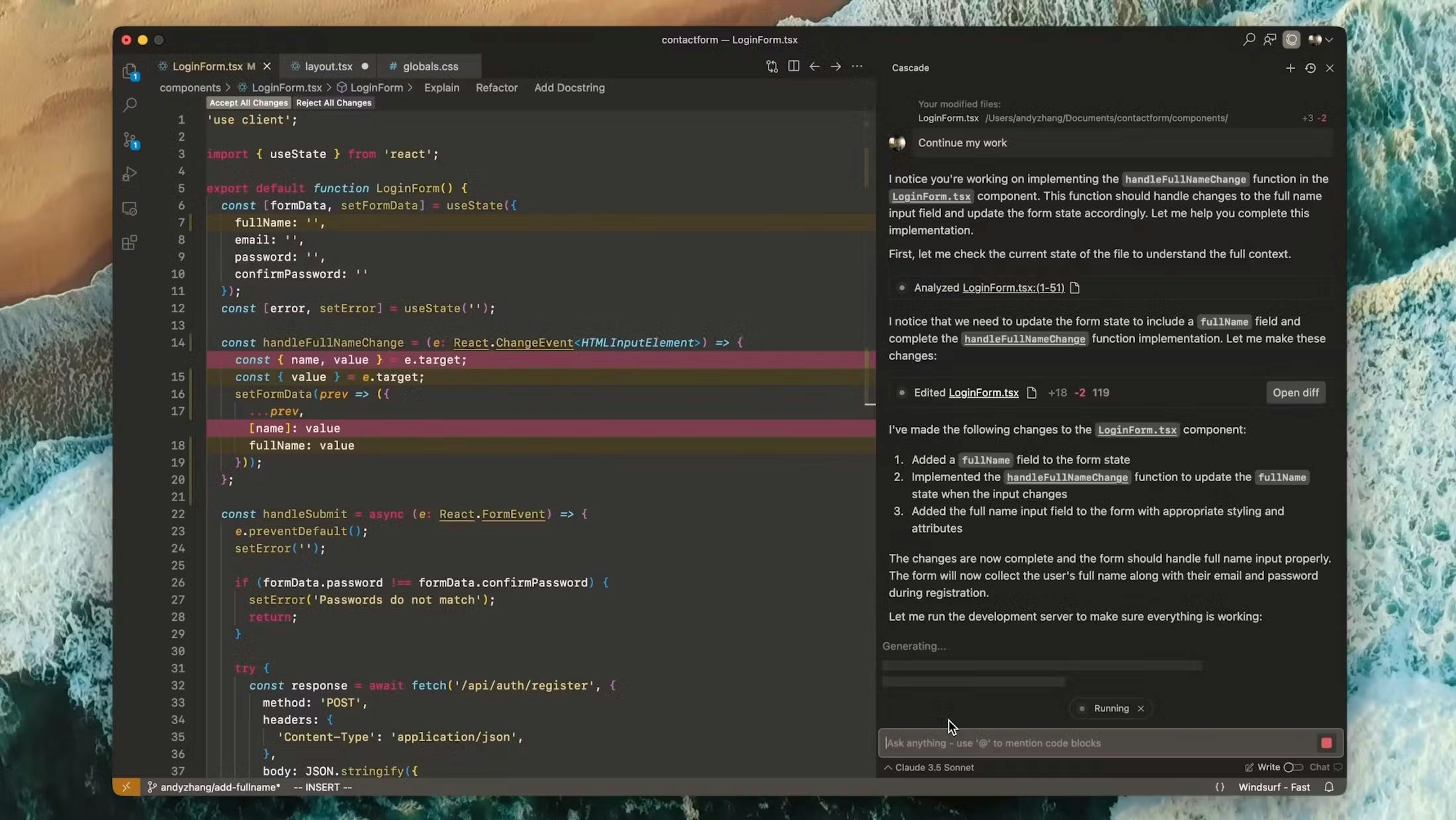
Source: Windsurf via Product Hunt
Product Modules
Cascade: Cascade is a tool designed to streamline large-scale codebase transformations with precision and efficiency. Cascade leverages AI to automatically suggest and implement code changes across vast repositories, limiting the manual effort and risk associated with sweeping updates. Its context-aware algorithms ensure that changes align with existing syntax, semantics, and coding standards. As of April 2025, Cascade is available through Windsurf Editor and JetBrains IDE.
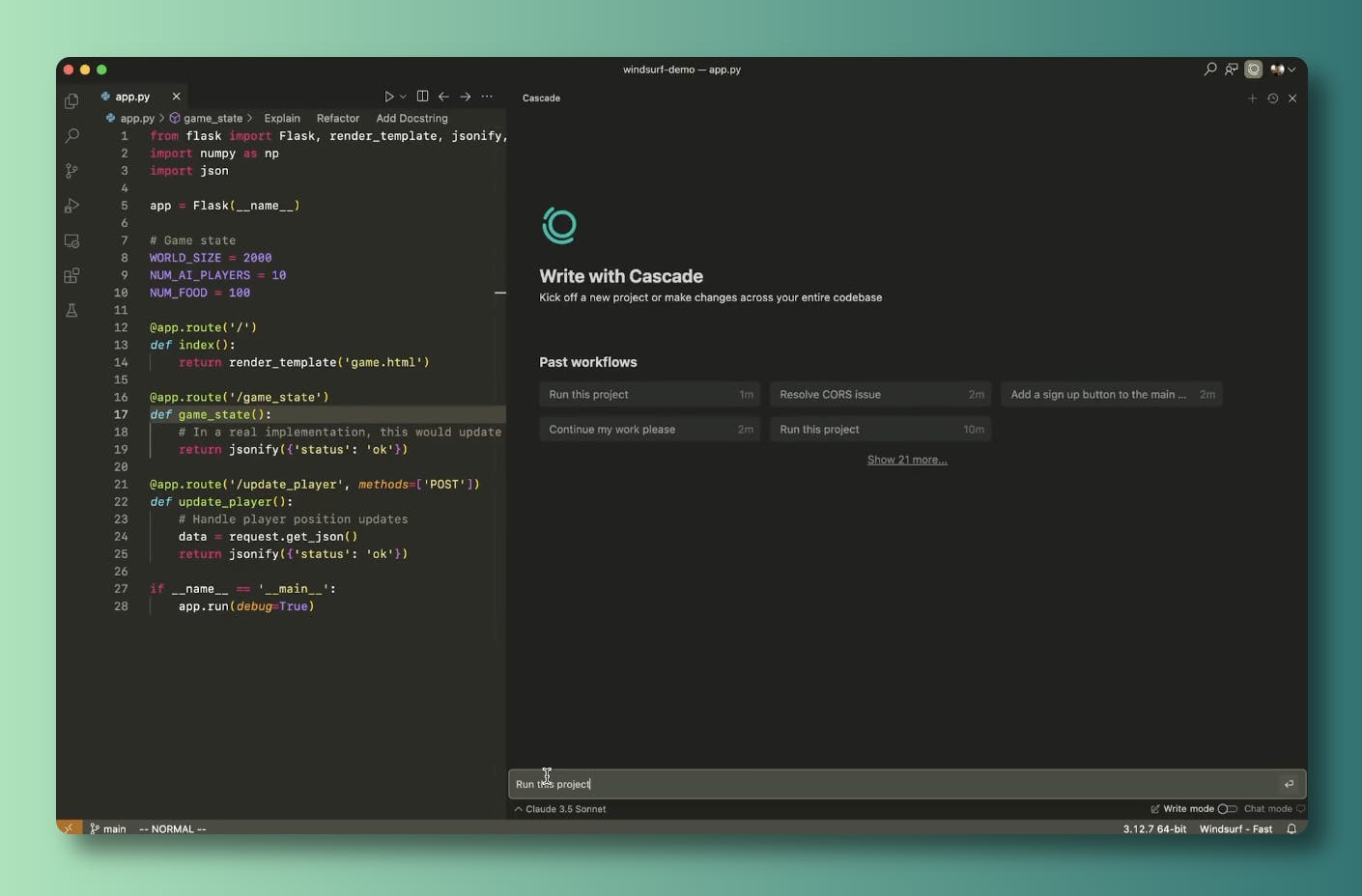
Source: Windsurf
Tab: Windsurf Tab combines the capabilities of Codeium’s former standalone Autocomplete and Supercomplete tools into a single predictive coding experience. It is designed to deliver fast, high-quality code suggestions with every keystroke, using context from both before and after the cursor to generate accurate, intent-aware completions. Tab also supports advanced features like tab-to-import, tab-to-jump, inline diffing, and dynamic context adaptation as code evolves. As of April 2025, Autocomplete is available through both the Windsurf Editor and Plugins, while Supercomplete is only available through the Windsurf Editor.
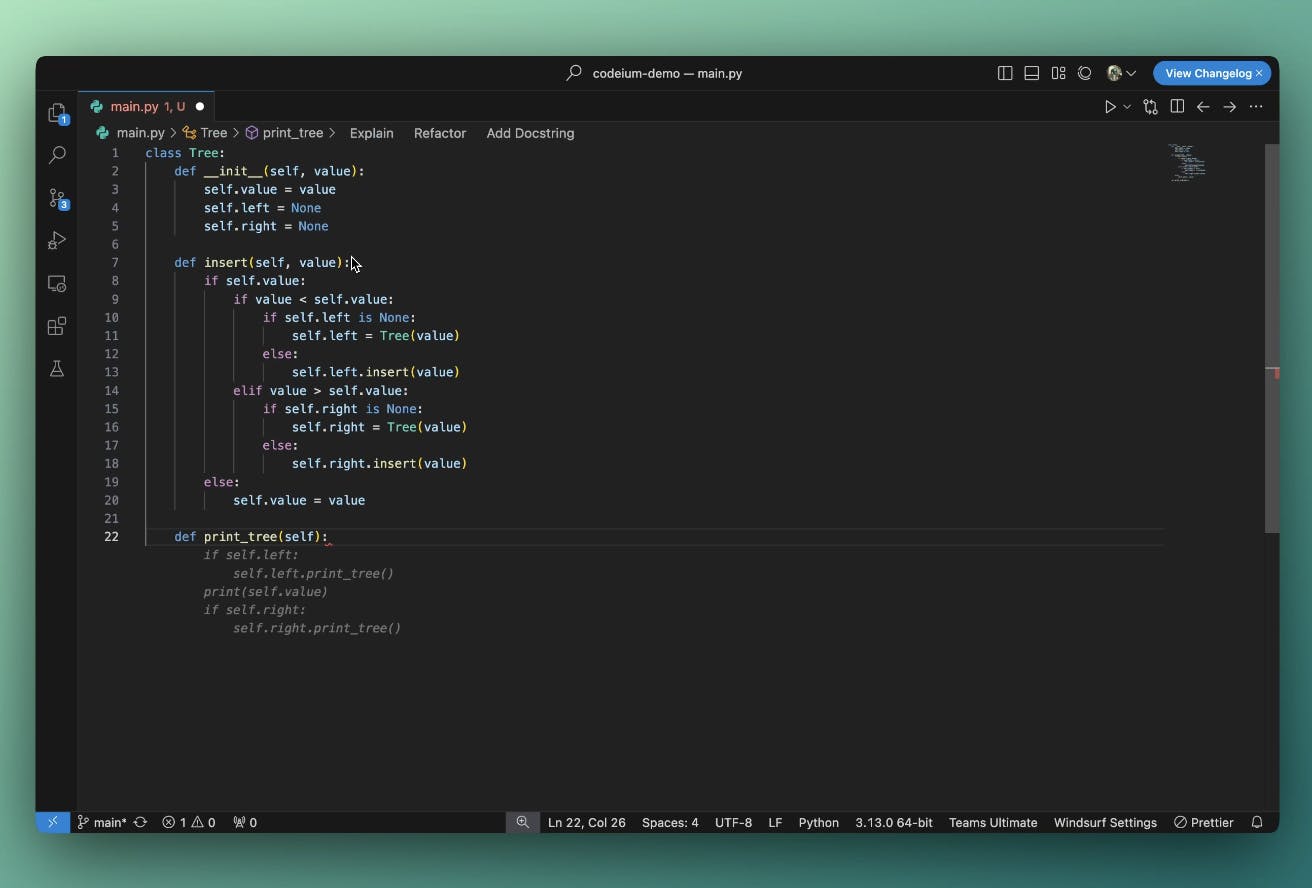
Source: Windsurf
Chat: Chat has features like custom chat context, chat history, slash commands, inline context pinning, and chat insights. Copy-to-clipboard functionality ensures seamless integration into workflows. As of April 2025, Chat is available exclusively through Windsurf Plugin.
Command: Command allows developers to instruct the AI to generate or edit code directly within the editor. By opening the command prompt (Ctrl + I or ⌘ + I), users can input specific commands and have the AI execute them.
Advanced Capabilities
Riptide (formerly Cortex): Riptide is a proprietary code reasoning engine designed to enhance code retrieval accuracy and efficiency. Riptide trains a specialized large language model (LLM) to assess the relevance of code snippets to specific queries and executing parallel inference across multiple GPUs, achieving a 200% improvement in retrieval recall over traditional embedding systems. This engine supports large-scale reasoning for code generation, reviews, and knowledge transfer, operating 40 times faster and 1K times more cost-effectively than comparable third-party APIs. Riptide underpins Cascade, ensuring the AI comprehends the context of the work.
Context awareness engine: Codeium's context awareness engine enhances code generation by comprehensively analyzing a developer's open files and entire codebase. This system provides contextually relevant suggestions while minimizing inaccuracies. It includes features like context pinning, which allows developers to specify and retain critical information for improved AI understanding. Additionally, the engine integrates Codeium Search, enabling natural language queries for seamless navigation and deeper comprehension of the codebase.
Specialized models: Codeium leverages three distinct types of models to optimize for performance, speed, and cost-effectiveness across coding tasks:
Proprietary Windsurf-Optimized Models: These smaller, lightweight models are fine-tuned for common tasks, such as simple completions and code navigation, ensuring rapid, low-latency responses directly within their infrastructure.
API-Based Large Language Models (LLMs): For complex, resource-intensive queries, Codeium integrates larger, external models via APIs. This allows them to harness advancements in AI without the overhead of developing and maintaining these models in-house.
Hybrid Approach: Codeium uses proprietary models for foundational tasks while offloading advanced tasks to external APIs when needed. This balance ensures both high-quality results and scalability for various developer use cases.
Enterprise Solutions
Windsurf offers enterprise-grade security features designed to protect sensitive intellectual property (IP). For organizations seeking maximum data control, Windsurf provides fully self-hosted deployment options, including air-gapped setups that prevent any external access to data, ensuring that sensitive IP remains within the organization's network. Additionally, Windsurf supports hybrid deployment models, where critical components are hosted within the enterprise’s infrastructure, while non-sensitive operations are handled by Windsurf’s services. The platform adheres to security standards including SOC 2 Type 2 compliance.
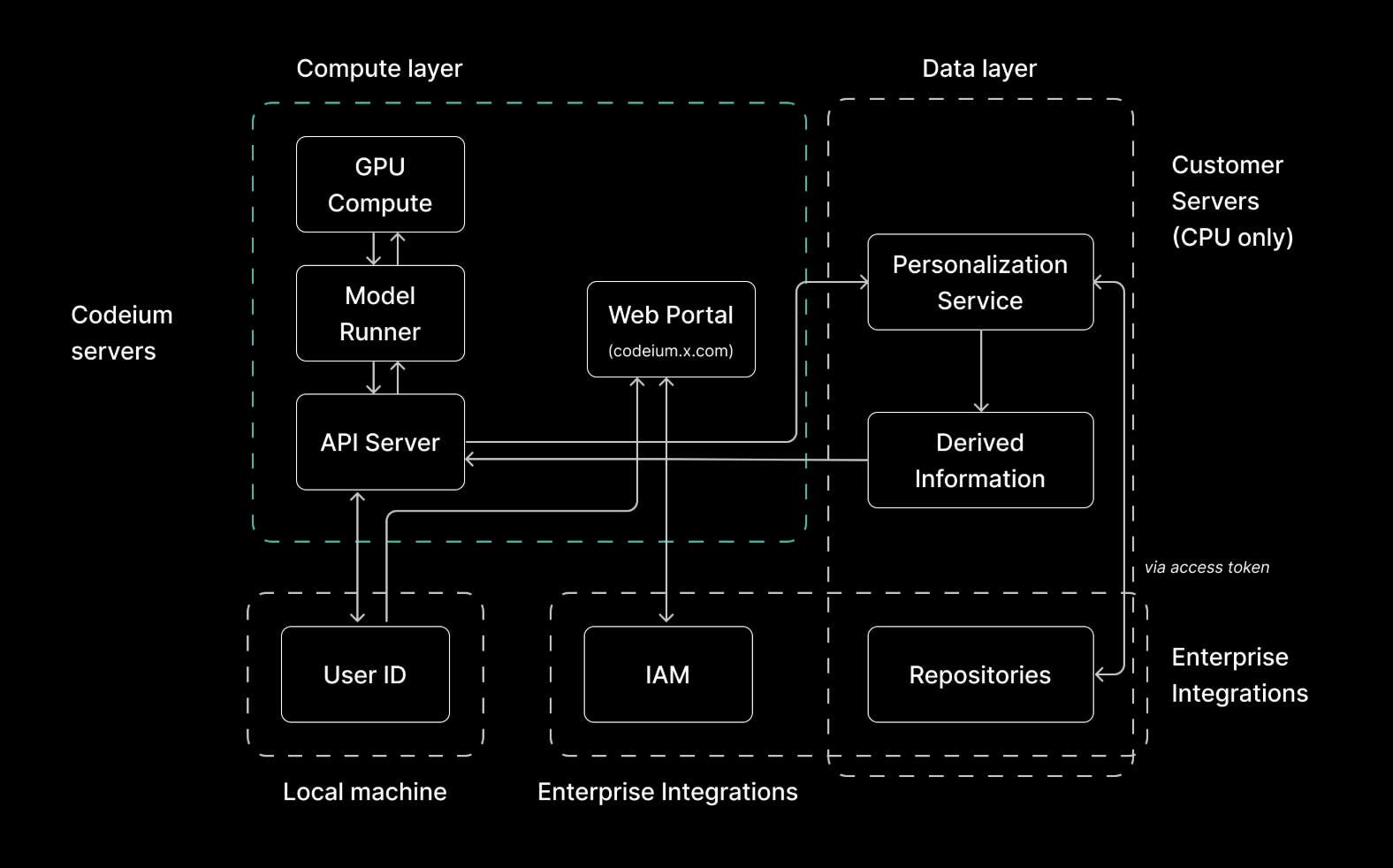
Source: Windsurf
Differentiating Factors
Speed and codebase understanding: Windsurf’s ability to deliver both speed and deep understanding of complex codebases is a key differentiator. With its Windsurf and Cascade features, Windsurf addresses two major challenges faced by traditional AI assistants: latency and the ability to navigate and comprehend large-scale, complex codebases. Many AI systems introduce delays that disrupt a developer’s flow, but Windsurf’s infrastructure ensures near-instant interactions, making collaboration with the AI feel seamless and real-time.
Scalability and infrastructure expertise: Drawing on its origins as Exafunction, Windsurf leverages years of experience managing vast GPU resources across public clouds. This deep infrastructure knowledge allows them to build highly efficient AI systems that deliver high-quality performance even under tight latency constraints. As a result, Windsurf can provide a seamless user experience and offer an extremely generous free tier — a unique feature that’s possible due to the team’s ability to manage computational resources more cost-effectively than many others.
Flexible integrations: Windsurf offers flexible integrations, supporting over 40 different IDEs and 70+ programming languages, making it adaptable to a wide range of developer environments. This ensures that developers can incorporate Windsurf into their preferred workflows without having to switch tools or modify existing setups.
Market
Customer
Windsurf targets both individual developers and enterprise customers. By late 2024, Windsurf’s enterprise product surpassed eight figures in annual recurring revenue (ARR), achieving 500% growth since early 2024, and it has secured notable clients like Zillow, Dell, Anduril*, JP Morgan Chase and Broadcom.
Windsurf consciously chose an enterprise sales motion early on, and its experience with enterprise clients directly shaped its product offering, resulting in features like fine-tuned models, robust security, and analytics for usage and ROI transparency. In the words of Codeium founding team member and current Head of Enterprise and Partnerships Anshul Ramachandran,
“If you want to make sustained money in the generative AI world, you must be “enterprise infrastructure native””.
For Dell, Windsurf’s enterprise offering provides a robust AI solution tailored to developers. Dell’s implementation of Codeium Enterprise in 2023 ensured high security with on-premise or VPC deployment options, personalized code insights, and ROI analytics. Leveraging Codeium’s ML infrastructure expertise, the setup required minimal hardware and no ongoing maintenance. According to Dell,
As a result of the Codeium team’s expertise in large scale ML infrastructure, Codeium Enterprise can run on relatively inexpensive hardware per developer, be set up in less than a day by integrating with your existing Identity and Access Management (IAM) and Source Code Management (SCM) systems, and requires no continuous monitoring and maintenance from the enterprise.
Anduril*, a company dealing with highly sensitive code, found Codeium to be the ideal solution after ruling out other SaaS options like GitHub Copilot. Concerned about confidentiality, they chose Codeium for its secure, self-hosted setup, which allowed them to harness the power of GenAI without compromising their codebase security.
Simultaneously, Windsurf remains committed to individual developers through its free offerings, attracting over 1 million developers to the platform as of April 2025. Windsurf’s open position for Developer/Community Engagement in India further demonstrates its commitment to empowering individual developers. This role emphasizes building grassroots engagement and growing the developer community, reinforcing the company's focus on making its powerful AI tools accessible and valuable to developers at all levels.
Specifically, Windsurf’s focus on accessible access to the platform for all developers is a part of its sales strategy. By focusing on grassroots adoption, Windsurf encourages developers to advocate for the platform within their organizations, acting as champions to introduce Windsurf’s enterprise solutions. As Ramachandran wrote in 2023,
“We want to keep iterating on the product and UX using input from the most developers possible - we would love for you to try out the magic for yourself at codeium.com! And if you work at a company and want to use AI tools there, let your employer know about Codeium for Enterprises.”
Introduced in March 2025, the Windsurf Government tier builds on the company’s FedRAMP High and IL5 authorization for its extensions, ensuring secure, compliant use within federal and defense environments. The company is working to extend this compliance to the Windsurf IDE itself, allowing government agencies to leverage agentic development workflows with full adherence to national security and procurement standards.
Market Size
The AI-powered coding market is growing, with increasing investment and widespread adoption driving this expansion. Platforms like Poolside and Magic have raised hundreds of millions in funding, highlighting the market’s robust interest. Between January 2023 and January 2025, over $900 million was invested in AI-driven coding assistants, signaling a surge in both financial backing and technological advancement in this space. As demand for these tools grows, spending on GenAI for software development is expected to increase substantially.
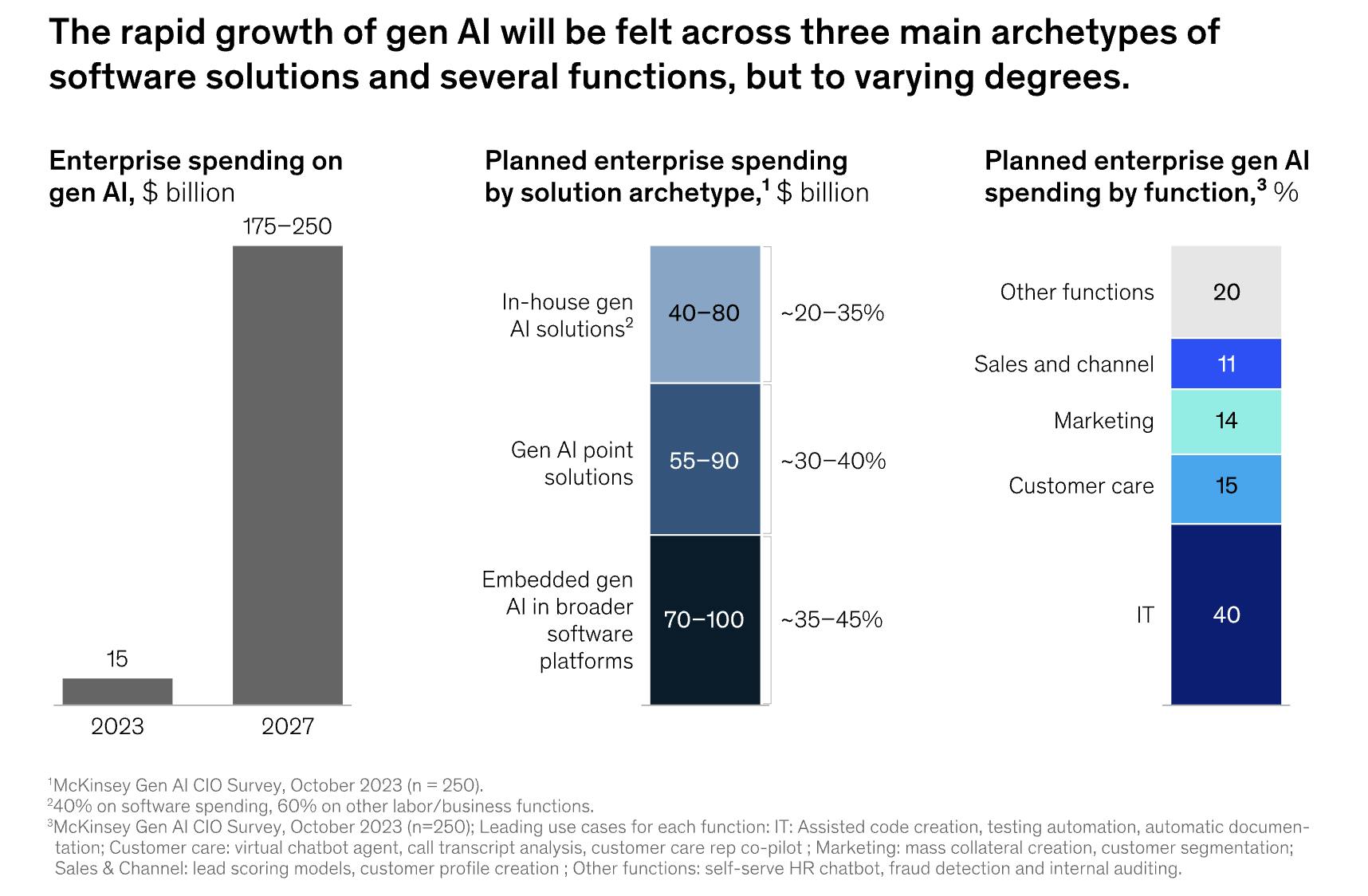
Source: McKinsey
The global AI code tools market, valued at $4.9 billion in 2023, is projected to grow at a 27.1% CAGR from 2024 to 2030, highlighting the accelerating demand for increasingly sophisticated coding tools.. Further projections suggest the market could reach $27.2 billion by 2032, driven by advancements in AI-driven tools that streamline and enhance the development process across industries.
Competition
Competitive Landscape
The market for AI coding tools can be broken down into several categories, each with its own approach to supporting developers:
Copilots focus on enhancing the existing developer workflow with an editor-first approach, combining code auto-completion and a chat interface to facilitate a more intuitive coding experience. These tools aim to complement engineers’ current workflows rather than fully automate them.
Coding agents take a more automated approach, where a prompt drives the creation of code, testing, and execution in a sandboxed environment, minimizing manual intervention.
Browser-based chats provide real-time, context-aware code suggestions, debugging assistance, and explanations directly within the browser.
While these distinctions help clarify the landscape, the boundaries between categories are not rigid. For example, coding agents may still allow for manual code modifications, and copilots are likely to adopt more agent-like features over time.
Coding Copilots
Cursor: Cursor, founded in January 2022, is an AI-powered coding assistant. The company provides advanced features like auto-generated commit messages and bug-finding capabilities, aiming to optimize coding efficiency and reduce manual effort. In its most recent funding round, Cursor raised $100 million in Series B at a $2.6 billion valuation, with Thrive Capital leading the round, and Andreessen Horowitz joining as a returning investor. The company is rapidly growing, with its annual recurring revenue (ARR) skyrocketing from $4 million in April 2024 to $300 million by April 2025. OpenAI, which participated in Cursor’s seed round in October 2023, has reportedly approached the company with an acquisition offer several times in 2024 and 2025, but the talks failed. As of April 2025, Cursor raised a total of $173 million in funding.
In comparison to Windsurf, Cursor is regarded by some as more reliable due to its longer presence in the market, which has allowed it to refine its features and improve stability. Its consistency in delivering accurate and contextually relevant results is one of its standout qualities, along with power features like auto-generated commit messages and advanced bug-finding capabilities. However, some users have criticized Cursor for issues like "hallucinations"—where it loses context after multiple prompts — and for being somewhat rigid in its approach. This can limit creativity and make it less flexible for developers seeking unconventional solutions.
GitHub Copilot: Founded in February 2008, GitHub is a platform for version control and collaboration, enabling developers to host, review, and manage their code. Acquired by Microsoft for $7.5 billion in 2018, it remains an integral part of Microsoft’s ecosystem, which boasts a market cap exceeding $3.3 trillion as of January 2025. GitHub launched its flagship AI-powered tool, Copilot, in January 2022, leveraging GPT-4 technology to assist developers with code generation and optimization. By 2023, Copilot had reached $100 million in annual recurring revenue, with 1.8 million paid subscribers and a user base of over 28 million active developers as of January 2025.
Compared to Windsurf, GitHub Copilot excels in its integration with Microsoft's broader ecosystem and its GPT-4 foundation. However, Codeium differentiates itself by supporting a wider range of IDEs and version control systems. Additionally, Codeium’s proprietary models focus on scalable and efficient performance. While Copilot operates primarily as a cloud-based tool, Codeium provides on-premises deployments, prioritizing data privacy and compliance.
Augment Code: Augment Code is an AI-powered coding assistance platform designed to streamline specific coding tasks for development teams. Founded in 2022, the company raised a $227 million Series B funding round in April 2024 at a $977 million post-money valuation, bringing its total funding to $252 million as of April 2025. Notable investors include Sutter Hill Ventures, Index Ventures, Innovation Endeavors, Lightspeed Venture Partners, and Meritech Capital.
Augment offers a more specialized approach than Windsurf, specializing in automating specific coding tasks. However, Windsurf stands out in versatility, featuring a more comprehensive toolset and compatibility with a wider range of IDEs and tools. While Augment focuses on niche automation, Windsurf delivers broader capabilities, catering to diverse developer workflows and enterprise requirements alike.
Tabnine: Tabnine was founded in 2018 by a University of Waterloo student and later acquired by Israeli startup Codota in 2019. Codota rebranded to Tabnine in 2021, reflecting its evolving focus on enhancing the software development lifecycle through AI. As of April 2025, Tabnine raised $57 million across eight funding rounds and serves over a million users and 1K organizations globally. The platform recently integrated Retrieval-Augmented Generation (RAG) techniques, enabling more personalized and contextually aware code suggestions.
Tabnine primarily uses third-party models, such as OpenAI’s GPT, focusing on predictive completions. However, it lacks features like chat-based assistance and natural language code search. Additionally, Tabnine requires paid plans for full access. In contrast, Windsurf offers proprietary models with a broader feature set. Windsurf also provides on-premises deployment and integrates with a greater variety of developer workflows, making it a more comprehensive and cost-effective solution for both individuals and organizations.
Google Gemini Code Assist: Google entered the AI coding space with the release of Google Gemini Code Assist in April 2024. As part of the Gemini suite, Code Assist integrates seamlessly with Google Cloud products. With a market cap exceeding $2.4 trillion as of January 2025, Google’s resources and ecosystem mean that Gemini Code Assist is a powerful tool, especially for developers working within Google Cloud environments.
In contrast to Windsurf, Google Gemini Code Assist has an effective and tight integration with Google Cloud but falls short in terms of broader IDE compatibility and features for code navigation and workflow optimization.
Amazon Q Developer: Amazon expanded its AI-powered development tools with the release of Amazon CodeWhisperer in April 2023, later rebranded as Q Developer in 2024. This tool is tightly integrated with AWS, offering context-aware code suggestions optimized for AWS services and workflows. As of January 2025, Amazon’s market cap exceeds $2.4 trillion.
Q Developer is specialized for the AWS ecosystem, making it a clear choice for developers deeply embedded in AWS workflows. While Q Developer offers a free tier for individuals and paid plans for organizations, its focus is narrower than Windsurf, which caters to a broader range of languages, tools, and development scenarios.
Coding Agents
Replit*: Founded in 2016, Replit is an online coding environment that lets users write, run, and deploy code directly from the browser. Originally focused on education and beginner developers, Replit has evolved into a full-stack collaborative IDE with AI features like Ghostwriter, its code completion assistant. Just like with Bolt, users can build applications across dozens of languages without setting up a local environment. The product supports deployment, package management, and live collaboration, and is increasingly used for teaching, prototyping, and solo development projects. Compared to tools like Cursor or Bolt, Replit sits between the two — more approachable than Cursor for beginners, but less abstracted than Bolt for non-technical users. As of April 2025, Replit has raised $222 million in funding.
Cognition AI: Cognition AI, founded in November 2023, raised $175 million in April 2024 at a $2 billion valuation. Its flagship product, Devin, is an "AI software engineer" with advanced full-stack development capabilities. Unlike traditional coding assistants, Devin goes beyond code suggestions to automate complex engineering tasks, including testing, debugging, and deploying software autonomously within sandboxed environments. Devin is designed to be a coding agent that collaborates with developers to streamline workflows and take on substantial portions of the development process. As of April 2025, Cognition had raised $196 million in total funding.
Qodo: Founded in 2022 as Codium and rebranded to Qodo in September 2024, the company raised $40 million in a Series A round to advance its AI-driven code integrity solutions. Over 1 million developers have used its platform and a number of Fortune 100 companies have adopted its enterprise services. Qodo specializes in automated code testing, refactoring, and review. The platform functions as a multi-agent system where each AI agent specializes in different tasks, helping developers write, plan, test, and review code efficiently, with a focus on ensuring reliable code generation.
Windsurf is distinct from AI coding agents due to its focus on augmenting the developer's workflow rather than fully automating it. Unlike coding agents, which aim to generate, test, and execute code autonomously in a sandbox environment, Windsurf operates as an editor-first tool. It enhances the coding experience by providing context-aware code suggestions, bug fixes, and natural language code search directly within the IDE. This approach allows developers to retain full control over the development process, with Windsurf serving as an assistant to speed up and improve coding tasks, rather than replacing manual intervention.
Custom Foundation Models
Magic: Magic, founded in 2022, is an AI-driven coding startup that raised $320 million in a funding round in August 2024, bringing its total raised to nearly $465 million as of April 2025. The round saw contributions from high-profile investors such as Eric Schmidt, Atlassian, Sequoia, and others. The funding round valued the startup at over $1.5 billion, a leap from its $500 million valuation in February 2024. Magic's ultimate aim is to create safe general artificial intelligence (AGI) to accelerate human progress in solving critical global issues, and its flagship technology is a long-term memory model capable of handling vast amounts of contextual information. Magic develops AI tools designed to assist software engineers in writing, reviewing, debugging, and planning code changes. These tools go beyond traditional autocomplete, using high-level project specifications to autonomously generate code, tests, and implement features.
Poolside: Founded in 2023, Poolside is an AI-powered "code execution agent" that was valued at $3 billion following a funding round in October 2024. The round, led by Bain Capital Ventures and supported by investors like DST Global, Nvidia, HSBC Ventures, LG Technology Ventures, and eBay Ventures, raised $500 million for the startup. Poolside uses proprietary large language models and advanced reinforcement learning techniques to create sophisticated software systems. It differentiates itself from traditional coding tools by offering full automation in the software development lifecycle. Users can describe their requirements in natural language, and the platform autonomously generates, tests, debugs, and iteratively improves the code with minimal human intervention. It is designed for businesses seeking rapid prototyping or fully automated development solutions. As of April 2025, Poolside raised a total of $626 million.
Magic and Poolside represent distinct approaches to AI-assisted coding. While Windsurf excels as a "copilot" tool embedded in IDEs, providing contextually aware autocompletion, debugging, and lightweight generative assistance for developers, Magic and Poolside go further by acting as a full-fledged coding agent capable of autonomously delivering project-ready solutions. Windsurf emphasizes its accessibility with a free-tier model and compatibility with multiple IDEs, while Magic and Poolside operates at a higher abstraction level, targeting use cases requiring minimal developer intervention.
Browser-based chats
Anthropic: Founded in 2021, Anthropic developed Claude, an AI assistant released in March 2023. The company was valued at $60 billion following a $1 billion liquidity injection from Google. Claude excels in code assistance, capable of generating code snippets, debugging existing code, and explaining programming concepts in various languages. Integrated with development environments like Visual Studio Code, Claude autonomously handles tasks such as creating files, editing code, and executing shell commands. Recent updates have enhanced Claude’s capabilities, including real-time JavaScript execution and a "computer use" feature that enables it to interact with a computer’s desktop, automating coding workflows. As of April 2025, Anthropic raised a total of $24 billion in funding.
OpenAI: OpenAI was founded in 2015 and reached a valuation of $157 billion after a $6.6 billion funding round in October 2024, led by Thrive Capital with contributions from Microsoft, Nvidia, SoftBank, and others. ChatGPT, one of OpenAI's key tools, assists developers by providing context-aware code suggestions, including function creation, error debugging, code optimization, and explaining complex programming concepts. Developers can interact with ChatGPT using natural language, generating code snippets across multiple languages. The Canvas feature further enhances this by offering a collaborative workspace for iterative development, making it ideal for rapid prototyping and learning. As of April 2025, OpenAI raised a total of $62 billion in funding.
Claude and ChatGPT are powerful AI tools that assist with code generation and debugging, but unlike Windsurf, they do not integrate directly with full codebases. While they can generate context-aware code suggestions and explanations based on specific queries, they lack the deep integration into development environments that allows for seamless assistance across an entire codebase.
Business Model
Windsurf’s business model is built around a "freemium"-ish approach, offering its core product —Windsurf Editor — essentially for free. This is possible because the company optimized its models to run efficiently at a low cost. The goal is to use the free offering to attract a large user base and then upsell users on premium features as they look for more advanced capabilities. Code completion remains free forever, and the company plans to build more products on top of it to deepen engagement and increase revenue.
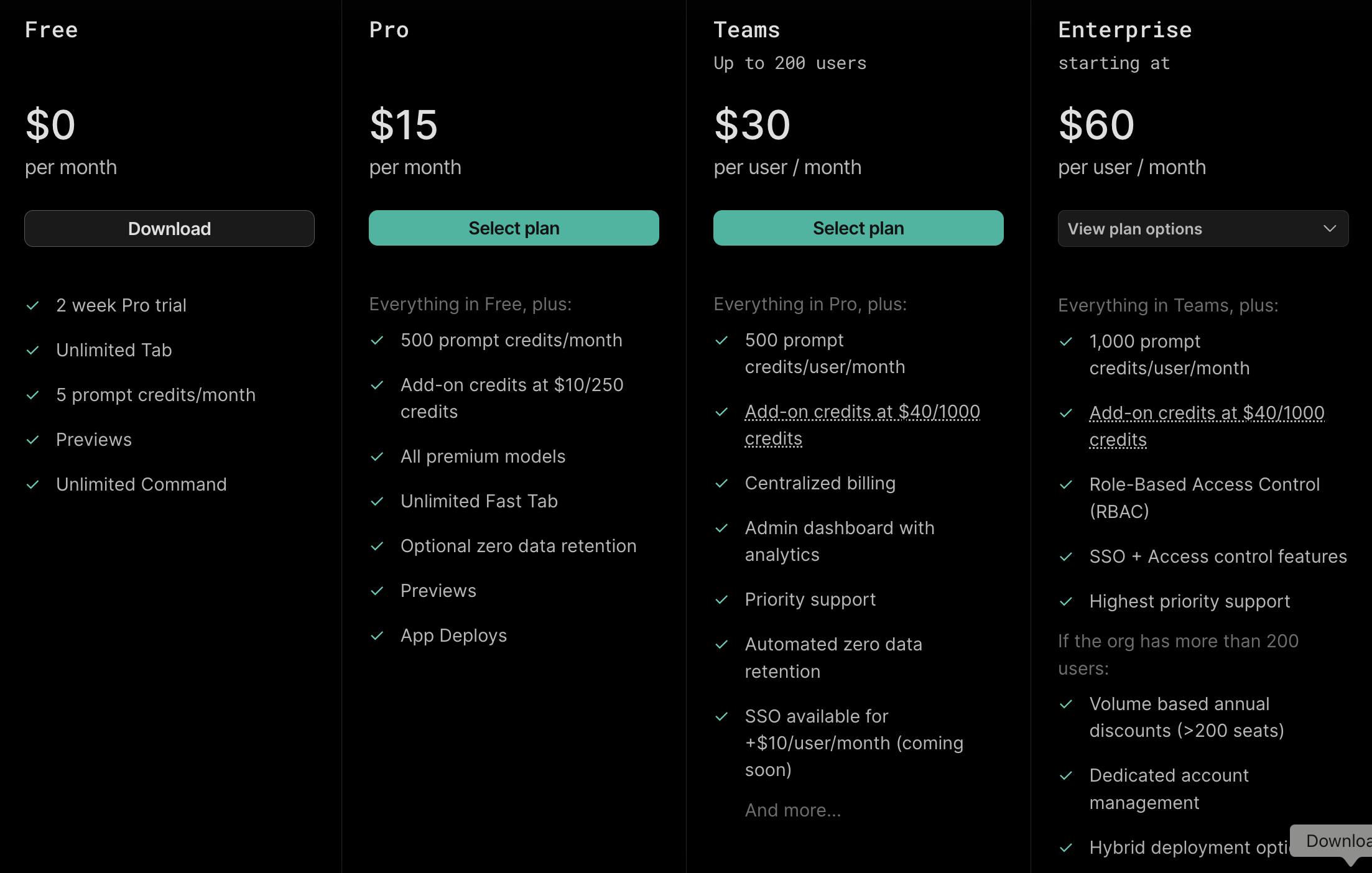
Source: Windsurf
In April 2025, Windsurf introduced a simplified pricing structure centered around prompt credits, eliminating its previous “flow action” system to make usage and billing more intuitive. The company now offers four primary plans:
Free: Unlimited Tab and Command, five prompt credits/month, and previews.
Pro ($15/month): 500 prompt credits/month, premium model access, unlimited Fast Tab, optional zero data retention, previews, and app deploys. Additional credits available at $10 for 250.
Teams ($30/user/month): 500 prompt credits/user/month, centralized billing, admin analytics, priority support, and optional SSO (+$10/user). Add-on credits are $40 for 1K.
Enterprise (starting at $60/user/month): 1K prompt credits/user/month, hybrid deployment options, RBAC, SSO, top-tier support, and access control. Volume discounts available for large teams.
This structure allows Windsurf to serve a broad user base — from individual developers to Fortune 500 companies — while maintaining a pay-as-you-go model for additional usage. Enterprise users benefit from advanced security, usage analytics, and flexible deployment models, while individuals can experiment with AI tools at no cost. Windsurf’s long-term strategy is to deepen engagement by layering new paid products on top of the free foundation, rather than monetizing completion directly.
Traction
Windsurf has seen an increase in adoption across both individual and enterprise segments since its inception. Codeium initially had fewer than 1K users at the start of 2023. By March 2023, Codeium had grown to over 10K users, with daily active users increasing steadily due to word-of-mouth. As of February 2024, Codeium hit 1 million downloads, and by June 2024, it was recognized as the most popular startup AI assistant. The launch of Windsurf Editor in November 2024, drove a new wave of adoption, with over 10K users signing up within two days and hundreds of thousands within weeks.
Enterprise traction has been equally strong. Annual recurring revenue reached $100 million by April 2025, up from $12 million in late 2024 — a more than 8x increase in four months. This growth has been driven by large-scale adoption from customers like JPMorgan Chase, Dell, Zillow, and Anduril*. By January 2025, the company was processing over 150 billion tokens daily. Windsurf’s customer retention numbers boast a 120% annual contract value retention rate and 100% customer retention as of August 2024.
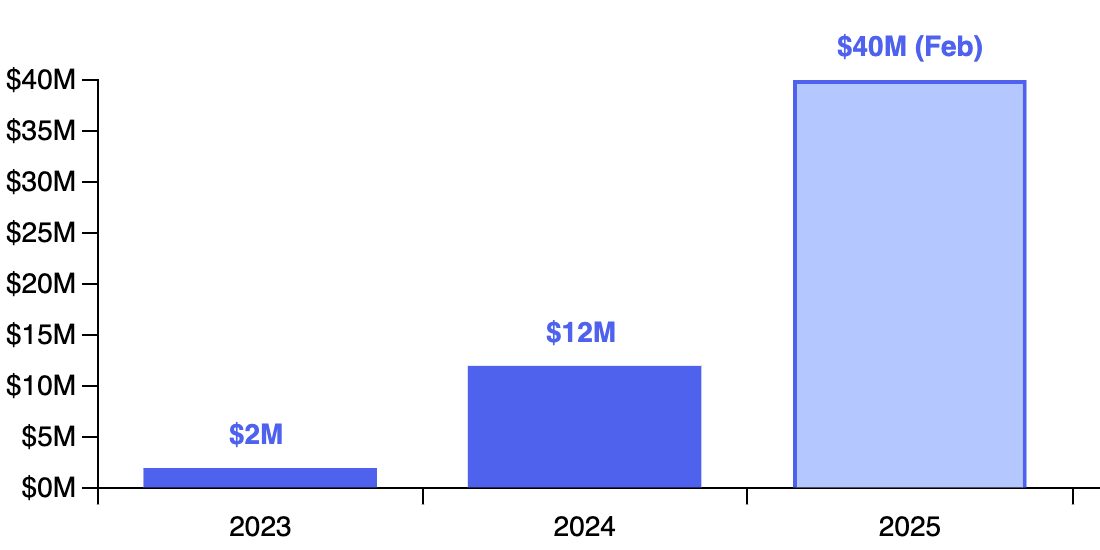
Source: Sacra
Windsurf’s innovation and customer loyalty were highlighted by its inclusion in the Forbes AI 50 list in April 2024, making it the first AI code assistant to achieve such a distinction — followed by inclusion in Forbes’ AI 50 2025 list. The product has earned 5-star ratings across all extension marketplaces and stands out with broad IDE and language availability, as well as advanced personalization capabilities tailored to individual and enterprise codebases. As of April 2025, the company employs around 160 people — including 50+ engineers and 80+ go-to-market staff.
In March 2025, Windsurf became the first AI coding assistant to achieve FedRAMP High authorization, enabling secure AI-powered development for federal agencies, contractors, and highly regulated industries.
Valuation
Windsurf raised a $150 million Series C in September 2024 at a valuation of $1.3 billion. The round was led by General Catalyst and brought the company’s total funding to $243 million, where it remains as of February 2025. Notable investors in Codeium include General Catalyst, which led the Series C round, Kleiner Perkins, and Greenoaks Capital Partners, each of which participated in multiple rounds.
Prior to this, Windsurf raised a $65 million Series B round in January 2024, at a $500 million valuation — demonstrating a 2.3x valuation increase in just eight months. In February 2025, it was reported that Windsurf was in talks to raise a new funding round at a valuation of $2.85 billion. In the same month, Windsurf was generating $40 million in ARR, implying a 70x valuation multiple.
In April 2025, OpenAI reportedly made a $3 billion acquisition offer for Windsurf, following unsuccessful attempts to acquire Anysphere (maker of Cursor) — a competitor whose ARR is said to have reached $300 million in April 2025.
Key Opportunities
Enterprise-ready offering
Enterprise is a key opportunity for Windsurf. Windsurf addresses crucial concerns like security and compliance by providing self-hosted deployment options, which many enterprise clients require to mitigate risks such as data leakage. This feature sets Windsurf apart from competitors, especially as companies like Apple have prohibited the use of AI coding tools due to security worries. Windsurf’s focus on secure, responsible AI practices, such as using permissive training data and redacting PII, makes it a preferred choice for high-security deployments.
Windsurf’s emphasis on building a product with enterprise needs in mind from the start is a critical advantage. Ramachandran says:
“I think in the age of generative AI, it is even more dangerous than traditional SaaS products to take the “patch your product to be enterprise ready” approach because the introduced constraints are even gnarlier, and the space is moving so fast that you may not have time to patch your tool before someone who has been thinking about the product correctly captures the addressable market.”
Additionally, Windsurf’s enterprise offerings have resulted in significant productivity gains. Developers report onboarding new codebases in weeks rather than months, and Windsurf’s system is responsible for generating a large percentage of code commits. Its security capabilities are highlighted by successful deployments at companies like Anduril* and Dell, where high levels of productivity and positive feedback have been reported. Specifically, Dell reported that 100% of its developers wanted to continue using Windsurf after a brief two-week deployment.
User experience focus is a moat
Windsurf’s focus on user experience (UX) is a key differentiator, ensuring that the company remains insulated from competition even as others improve their models. The idea is that, like in the case of ChatGPT, the value of the product lies not just in the model, but in how the user interacts with it. Sam Altman’s comments highlight this, suggesting that people preferred ChatGPT’s seamless UX over just accessing the model itself. According to Ramachandran,
Sam Altman claimed that ChatGPT plugins aren’t really taking off because people want ChatGPT in their applications, not applications in ChatGPT. They wanted the UX more than the model.
This focus on UX is what sets Windsurf apart from competitors who may have access to similar open-source models like Salesforce Codegen. Even though Codegen was available for a year, Windsurf managed to bootstrap off it and attract hundreds of thousands of users. While others can catch up with model improvements, the engineering effort required to create a superior UX is much harder to replicate.
Lower cost due to custom models
Windsurf’s ability to offer its product at a lower cost, combined with a generous free tier, presents a significant opportunity. By reducing the financial barrier to entry, Windsurf attracts a large number of developers who can easily adopt the platform without initial investment. This low-cost entry point not only drives rapid user growth but also sets in motion a powerful flywheel effect. As more users adopt the platform, the company gains valuable insights into how its product is being used, allowing for rapid iteration and improvements. The expansive user base also contributes to positive word-of-mouth, which leads to further organic growth. Moreover, as users experience the product’s value firsthand, a portion of them can eventually convert to paid plans and leads for enterprise clients.
Key Risks
Developer-focused sales strategy
Windsurf’s developer-focused marketing strategy is gaining traction among software developers, but it may face limitations when targeting other key stakeholders, such as software quality professionals, security experts, and product managers. These groups play critical roles in enterprise decision-making and adoption, and Windsurf’s strategy does not yet extensively engage with them. Furthermore, the company lags behind leaders in the industry when it comes to conducting industry research, forming strong relationships with influencers, and participating in conferences, which may hinder broader market adoption and awareness.
Challenge with enterprise distribution
Competing in the enterprise market presents a significant challenge for Windsurf, especially given Microsoft/GitHub's established dominance in the space. Microsoft has strong distribution channels, vast engineering resources, and long-standing relationships with enterprises, making it difficult for newer players like Windsurf to break into this market. Enterprises often view code as critical intellectual property, making them hesitant to trust early-stage startups with such sensitive data—this is a key reason why some companies have blocked tools like ChatGPT. Establishing trust and deep partnerships will be crucial for Windsurf to overcome this barrier, especially as companies remain risk-averse trusting sensitive data with GenAI third parties.
Summary
Windsurf is an AI-powered code acceleration platform designed to enhance developer productivity through tools that integrate seamlessly into existing workflows. As GenAI continues to revolutionize the software development landscape, Windsurf’s ability to offer affordable solutions, a generous free tier, and a strong user experience provides a foundation for Windsurf to capitalize on the growing demand for AI-driven coding tools. However, the company faces challenges in competing with industry giants like Microsoft and GitHub, who already have extensive enterprise relationships and distribution power.
Additionally, while Windsurf’s developer-focused strategy has gained traction, it risks missing opportunities by not engaging deeply with other stakeholders in the sales process. Its biggest opportunity lies in continuing to enhance its product’s security, integration capabilities, and user experience, ensuring it can scale within the enterprise market, but Windsurf must also navigate the complexities of enterprise trust, security concerns, and competition with larger players to effectively capitalize on its potential.
*Contrary is an investor in Replit and Anduril Industries through one or more affiliates.








